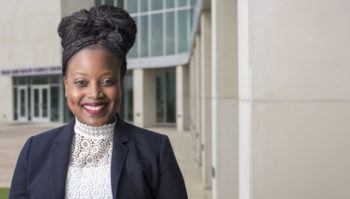Public Health Professor’s Journey To Discovering Her ‘Path’

Alva O. Ferdinand has accomplished a great deal since beginning her career in academia in 2013. As an associate professor in Health Policy and Management at the Texas A&M University School of Public Health and director of the Southwest Rural Health Research Center, Ferdinand’s research has influenced life-saving health policies, particularly Texas’ texting while driving ban.
Her research has been recognized in several national media outlets, including CNN, US News and World Report, the Associated Press and The Washington Post. Ferdinand has also won numerous awards for her research, including the Texas A&M School of Public Health’s 2020 Faculty Research Excellence Award. Although she is highly accomplished in her field, Ferdinand’s journey to her career path was a humbling experience.
She was faced with challenges that germinated self-doubt. However, she ultimately overcame these obstacles through hard work, determination, the support of her family and an attentive mentor.
Overcoming Obstacles
Ferdinand grew up in the twin-island Republic of Trinidad and Tobago — the southernmost island country in the Caribbean — in a large extended family. Despite the challenges of poverty, Ferdinand’s parents both attended college and started careers in education. Because of her parents’ careers, Ferdinand “basically grew up on a university campus,” she said.
“My mother taught for decades at the elementary school on campus, while my father was a university administrator who eventually became president of the university,” Ferdinand said. She dreamed of one day wearing the colorful regalia faculty and graduates wore during graduation ceremonies.
“My parents strongly believed in education,” Ferdinand said. “It was something that my siblings and I knew that we had to take seriously. We were encouraged to find what we were passionate about and to take educational steps that would allow us to flourish and use our passion and expertise for good.”
From an early age, Ferdinand knew that she wanted to go to law school and work in the legal profession in some way. To prepare for law school, she earned her Bachelor of Arts in international studies from Oakwood University in Huntsville, Alabama, in 2003. By 2006, she had completed law school at the Michigan State University (MSU) College of Law and worked at both MSU’s Center for Ethics and Humanities and the Life Sciences and at a criminal law firm.
However, she didn’t enjoy her career in law as much as she had hoped. Her experience at the criminal law firm confirmed that litigation was not what she wanted to do in the long-term. After some encouragement from her parents, Ferdinand began asking herself, “What could I pair my law degree with to really be more impactful on a broad level?” Thinking back on her time in law school, she got her answer — public health.
“I had gotten my first formal exposure to public health in law school,” Ferdinand said. “My public health law elective got my wheels turning on how we could continue to leverage the law to impact the health of populations. I was intrigued by the prospect of exploring public health from a health policy perspective, so I decided to pursue a master’s of public health.”
Ferdinand earned her Master of Public Health from the University of Alabama at Birmingham in 2008, focusing on health care organization and policy. Her professors encouraged her to continue her education by earning a Doctor of Public Health degree, so she remained at the University of Alabama at Birmingham for another few years. However, coursework for the doctoral degree, particularly statistics and other methods classes, were challenging for Ferdinand.
“At some points I thought, ‘Maybe I shouldn’t be doing a doctorate. Maybe I should walk away from this,’” Ferdinand said.
Luckily, one professor and researcher changed Ferdinand’s life forever by becoming a patient, trusting mentor and advisor.
“One day I was in my advisor’s office for tutoring, when Dr. Nir Menachemi walked by,” Ferdinand said. “At the time, he was recently hired faculty member at the university. He asked my advisor what concept I was trying to understand, then went to the whiteboard and explained the concept to me in a way that was crystal clear. He emailed me later that evening and said, ‘It was nice to meet you. I think what’s happening is that statistics is being explained to you in Greek, and you’re trying to understand it in English, and it’s just not coming together. If you’re open to it, I’m willing to do an independent study with you to teach you statistics from the beginning.’
“I took him up on that offer, and every day he had me run some analyses and interpret the findings,” she said. “He was a professor who saw my potential when I could not, and he pushed me to not give up. If not for his intervention, I perhaps would be doing something entirely different with my life today.”
Giving Her Research “Life”
Nearing graduation, Ferdinand began to think of her next step in life. She traveled to Texas A&M University in early 2013 for an interview for a faculty position. T
here, she met Jane Bolin, who shared a similar educational background and research interests with Ferdinand. A week after the job interview, Bolin contacted Ferdinand and offered her an opportunity to be an investigator within the Southwest Rural Health Research Center. Ferdinand accepted the offer and began working for the research center while finishing up her doctorate in Alabama. Later, she ultimately accepted a faculty position at the Texas A&M School of Public Health and made Texas her new home.
Shortly after arriving at Texas A&M, Ferdinand became the deputy director of the Southwest Rural Health Research Center.
“I chose Dr. Alva Ferdinand as deputy director, and later as director, because of her expertise, knowledge and skills,” Bolin said. “She is an excellent researcher and policy analyst. More than that, Dr. Ferdinand is also an excellent writer. As a person she is great to work with and very skilled at leadership and working with people. Dr. Ferdinand is passionate about rural and underserved populations. At the national and state level she is highly regarded.”
While settling down in Texas, Ferdinand began publishing her dissertation research, which focused on texting while driving bans and their effectiveness in reducing motor vehicle fatalities and hospitalizations. Ferdinand’s research employed a national perspective, comparing and contrasting states with and without a ban to determine if the bans were decreasing texting-related vehicle accidents and deaths. At the time, Texas was only one of four states that did not have a texting while driving ban, but efforts to pass a law banning texting while driving were years in the making.
“There were advocacy groups that were saying, ‘We need a texting while driving ban,’ but the science wasn’t there just yet,” Ferdinand said. “As soon as my paper became public, I started receiving emails from people, including legislative staff for elected officials in Texas, who had read my paper. They wanted to talk about what the findings of the study meant and wanted Texas-specific findings on how many lives could be saved if this ban were to be passed in the state.”
When Ferdinand began providing Texas-specific data to Texas government officials, “that was when the ban started to become real, and eventually it passed,” she said. Since then, Ferdinand’s research on the effectiveness of texting while driving bans has gained national attention, and the ban in Texas has saved countless lives.
“I think fate had something to do with it,” Ferdinand said. “It was the perfect merge of my expertise and the need for this law in Texas.”
Looking To The Future
Now that she has earned tenure, Ferdinand looks forward to a new chapter in life. She plans to continue publishing impactful research both through her position as associate professor and as director of the Southwest Rural Health Research Center. She is enthusiastic about her career and doesn’t see her drive changing anytime in the near future.
“I really cannot think of a day since starting my academic career at Texas A&M that I thought, ‘I don’t want to do this anymore,’” Ferdinand said. “I feel so fortunate to get paid to engage in research that I’m interested in and to have found this path. I am so glad that I stuck with it.”
Seeing her research “come full circle” and make a positive impact on population health outcomes is extremely motivating for Ferdinand. She is also highly motivated by teaching and mentoring students. She often thinks about her time in graduate school and feels that she wouldn’t be where she is today without mentoring. She continues to “pay it forward” for her students, and keeps an eye out for those who may be facing instructional challenges.
For those who dream of a similar career, Ferdinand offers this advice: “There will always be naysayers, but keep working hard, keep an open mind, and don’t be afraid to collaborate with people who possess different kinds of expertise. Above all, make sure you’re doing what you want to do — pursue avenues that you are passionate about.”
This article by Callie Rainosek originally appeared on Vital Record.





